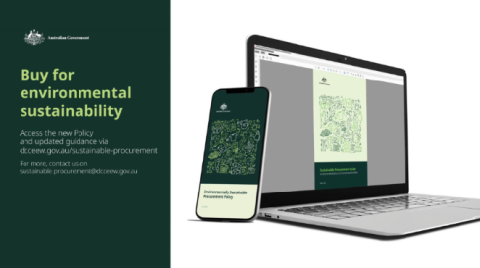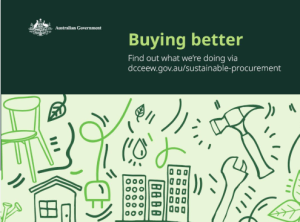By Pamela Proud, Commonwealth Sustainable Procurement Advocacy and Resource Centre (C-SPARC), Department of Climate Change, Energy, the Environment and Water
Many of us stroll through shops, making purchasing decisions based on our values and budgets.
- ‘Where was this made?’
- ‘Is this product produced ethically?’
- ‘Is it in my price range?’
- ‘Which of these products has less impact on the environment?’
Does any of this sound familiar? Even a simple purchase can make us think twice about our decision, and government procurement should be no different.
The Commonwealth Government requires procurement officials to consider a range of factors in decision making; primarily among them is the principle of ‘value for money’. However, there is also a strong commitment to sustainability, including minimising negative environmental impacts. This is a huge responsibility, but can lead to some positive outcomes and initiatives.
Environmentally sustainable procurement is an emerging field for government procurement professionals. It provides a platform for procurers to develop new skills, as well as creating a system for them to support the Australian Government make positive contributions to our environment.
The Government has recently approved the Environmentally Sustainable Procurement Policy (ESP Policy) as a Procurement Connected Policy (PCP) to provide guidance to Procuring Officers in incorporating sustainability elements into procurement processes. The intent of the Policy is to reduce the environmental impact of Australian Government procurements and to provide certainty to business and industry, encouraging innovation and investment in sustainable practices. It positions Commonwealth procurers as leaders in Australia’s sustainable economy.
Harnessing the Government’s substantial and stable spend for positive environmental change is not just an opportunity, but a responsibility.
The ESP Policy will take effect from 1 July 2024, and is mandatory for all Corporate Commonwealth Entities and prescribed Non-Corporate Commonwealth Entities. It will require environmental sustainability to be considered (and measured) in procurements which fall into specified categories. It will commence with procurements in the construction services category, at or above $7.5 million in value. This will be followed up by the introduction of procurements of ICT goods; furniture, fittings and equipment; and textiles at or above $1 million in July 2025.

New skills for procurers
Uplifting capability in environmental sustainability won’t require qualification in environmental science. It’s often a case of common sense, just like it is when browsing through the shops on the weekend.
Government procurement can be complex, but there are ways to learn more about environmental considerations. The Commonwealth Sustainable Procurement Advocacy and Resource Centre (C-SPARC) in the Department of Climate Change, Energy, the Environment and Water is the responsible department for the ESP Policy and will be providing a variety of resources and training opportunities to enable environmentally sustainable procurement upskilling for procurers.
Releasing mid-year on LearnHub will be four self-paced training modules, each in a digestible 20 minute format. These will teach the basics of environmentally sustainable procurement through to ‘how to apply it in the government’ context. Also, keep an eye out on the GovTeams “Procurement and Contract Management Community of Practice” site and the Department of Finance’s Procurement Bulletin for notices of upcoming events and related professional development opportunities. Alternatively, contact C-SPARC or head to the website to discover short masterclass recordings and case studies.





